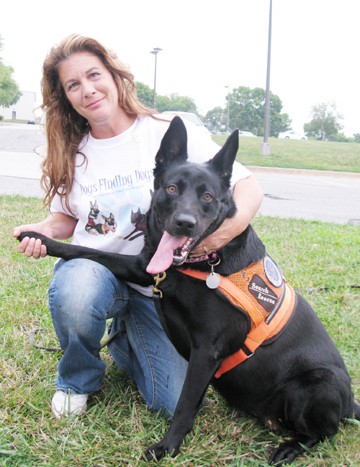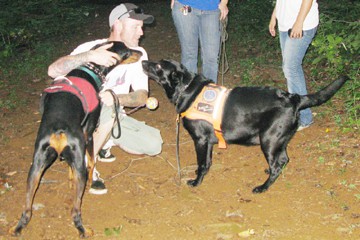The Nose Knows
Heidi doesn’t run. She surges. The original tracker for Maryland’s Dogs Finding Dogs, Heidi is expert at following the scents of animals who leave home without their owners. When the black German shepherd gets the scent, she follows her nose wherever it takes her: through brush, across mud, over concrete and anywhere else your pet may have gone.
Today’s quarry is easy: Heidi is on the scent of Corpsman, a Doberman member of the Dogs Finding Dogs team. It’s a training exercise, but Heidi is all business once her tracking vest goes on.
“This is going to go quick,” says Anne Wills, the woman at the end of Heidi’s leash and the founder of Dogs Finding Dogs. “When our dogs are on a hot scent, they run like their tails are on fire.”
Wills shows Heidi Corpsman’s collar. The dog sniffs and takes off, nose low. The team runs through trails at Catonsville Community College until Heidi finds her dog.
What makes Heidi so good at her job?
It’s all in the nose.
Signature Scents
When it comes to sniffing out a trail, dogs are experts. Renowned for their sensitive noses, canines have helped humans track prey, sniff out tasty treats, locate drugs and find loved ones.
“If you walk into the house and cookies are baking, you smell the cookies,” explains Wills. “Dogs smell each individual ingredient in the cookies.” Their sense of smell is about 100 times more acute than ours.
Because of their power of scent, Wills’ dogs only need a scent item from a lost pet to distinguish it from the millions of smells they encounter every day. Given an item used by two animals, they can pick out the unique scent of the missing animal — provided you don’t bring the other animal to the trail.
“We can track anything that walks on the ground. Everything leaves a scent, whether it’s a turtle, a pig, a cow or a chicken,” Wills says.
 |
The Searchers
Dogs Finding Dogs began to harness Heidi’s excess puppy energy.
“Her drive is very high,” says Wills of her dog. “I started training her for Schutzhund competitions. One of the components of Schutzhund is tracking, and Heidi was off the charts.”
Training with police K9s and competition dogs, Heidi proved that she had an exceptional nose for finding animals. Wills decided to put that nose to good use.
“The facility I was training in kept getting calls from people who had lost their animals,” Wills says. None of the other trainers had the time to go into neighborhoods looking for pets. Wills did.
Six months later, in August of 2008, Wills founded Dogs Finding Dogs. Joining her were two fellow trackers willing to work part-time. Today, Dogs Finding Dogs sends 11 teams to search for animals in Maryland, D.C., Virginia and Pennsylvania.
“To make ourselves different from the so-called pet detectives, who are scam artists, we made ourselves a non-profit. That way we can help everybody,” explains Wills.
She also holds her dogs to a higher standard. All of Wills’ teams are certified with the Canine Good Citizen program and through the National Tactical Police Dog Association. Wills insists on weekly training sessions to make sure all the dogs remain up to par.
All of the dogs are animal friendly too, meaning that if you lose a cat, hamster, snake or any other non-dog creature, you can be sure that Wills’ teams will be looking for your pet — not a snack.
Lost
When an animal goes missing from a backyard or runs off during a walk, many owners don’t know what to do. It’s an emotional time. Wills understands the panic.
“Most people when they call are desperate and just want hope,” she says.
That was the case with Rosa Wilson. “I just wish we had known about them sooner,” says Wilson, who lost her Pomeranian, Munchie, on a visit to Westminster. After two days of searching, Wilson learned about Dogs Finding Dogs.
“When people call in, they get counseling for free,” Wills explains. “We tell them what to do immediately.”
Wills tells each caller how to launch a search: which shelters to call, where to post reports, what to say and how to set up scent trails and feeding stations that could lure the animal back.
“Then we offer the tracking dog,” Wills says.
Tracking Munchie through poison ivy, Wills and Heidi discovered that a fox had chased the frightened pooch into the woods.
“Ultimately her guidance and knowledge helped us find her,” Wilson says.
Dogs Finding Dogs asks for a $175 donation, which goes into buying training materials, working vests and other equipment.
Can’t pay? Not a problem.
“If someone can’t afford to make a donation, we go anyway,” says Wills. “The Walker fund was set up for those cases” by Paul and Betsy Marchand of Finksburg in honor of their pup Walker, for whom Dogs Finding Dogs searched.
“We do a really high volume of cases,” says Wills, “about 1,300 cases so far.”
Word of mouth pushed the increase. Wills fielded calls from California kennels for reliable trackers. Unable to travel across country to track with Heidi, Wills plans to expand.
“We’re going to set up branches in California, Houston, Atlanta, Massachusetts and Chicago. We’re trying to put together travel teams and branches. We have to,” Wills says. “Every week I get five to seven phone calls, and all we can tell them is what to do.”
 |
Found
Tracking is “not a miracle or magic,” Wills says. “It’s a tool to show us where your dog has been.”
Some of those places are pretty amazing. Wills and Heidi have found cats in ceilings, horses galloping through neighborhoods and a bearded dragon that had gone on a tour of a house.
Dogs Finding Dogs has opened up Wills’ eyes to the realities of missing animals.
“Forty-five percent of our cases are stolen dog cases,” Wills reports. “They’re stolen for bait, stolen to sell and stolen for breeding. Sometimes the person thinks your dog is cute and doesn’t want to give it back. They ignore collars and micro chips. If they want to keep your dog, they will.”
On the plus side, she says, “we’ve gotten good at flushing them out.”
The telltale sign of a stolen dog is a track that stops cold. Often tracks will stop in front of houses, indicating that the missing dog has been taken in. Police are called, and Wills helps owners file the reports to get quick action.
Once police step in, most thieves return the dog or ditch it at a shelter to avoid further scrutiny.
The hardest cases are those that end in a dead pet.
“Your heart just bleeds,” Wills says. “You get close to your clients.”
It upsets the dogs, too, but for different reasons. If the pet is dead, trackers can’t reward their pups in front of grieving owners.
“If my dog starts whining on the track, I know what I’m in for,” Wills explains.
When the track ends with heartbreaking news, Wills believes that bringing closure to pet owners is worth the pain.
End of the Trail
In the woods around Catonsville Community College, Heidi’s nose leads her down a wooded path where Corpsman and his trainer Jim wait. Quarry found, Heidi celebrates by jumping around Wills. Corpsman, happy to be found, joins in the fun.
The reward for a successful track is a rubber ball. Toy lolling in her mouth, Heidi is not a working dog. She’s an ecstatic pooch. She trots around, nose aloft.
Who can blame her? It’s a pretty great nose.
For more information or to volunteer, visit www.dogsfindingdogs.com.
